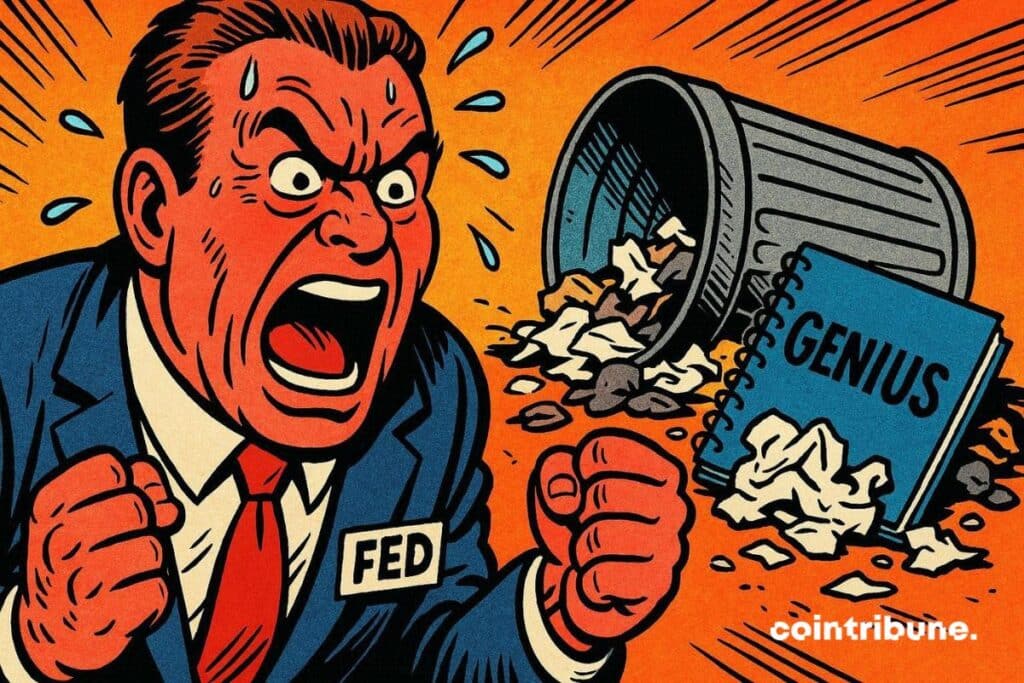Stablecoin : The Fed denounces critical flaws of the GENIUS law
The GENIUS law, meant to secure stablecoins in the United States, is criticized by the Federal Reserve. Michael Barr, Fed governor, pointed out major gaps in its regulatory framework, exposing crypto users to systemic risks. A reassessment that shakes confidence in stable digital assets.

In brief
- The Fed criticizes the GENIUS law for its gaps, exposing stablecoins to risks of regulatory arbitrage and systemic crises.
- Dollar stablecoins, despite their dominance, remain vulnerable due to unbacked reserves and lack of user protection.
- Europe launches EUROD, a euro-backed stablecoin, to reduce dependence on the dollar and redraw the balance of power in the crypto sphere.
The GENIUS law: a regulatory advance with glaring flaws
Adopted to regulate stablecoins in the United States, the GENIUS law imposes strict rules:
- Full backing in dollars;
- Annual audits for major issuers;
- Federal supervision.
However, Michael Barr, Fed governor, recently highlighted its major limits. According to him, some products claiming to be “stablecoins” escape this framework, creating a dangerous legal ambiguity.
The risk of regulatory arbitrage is particularly concerning. Issuers could exploit differences between federal and state regulators to bypass rules, as FTX did before its collapse. To this end, Michael Barr stresses the need for enhanced coordination to prevent high-risk activities from proliferating under the guise of apparent compliance.
This situation raises a crucial question: does the GENIUS law, meant to secure the crypto market, not create new vulnerabilities? The gaps identified by the Fed could weaken investor confidence in American stablecoins.
Stablecoins: between technological promises and systemic threats
Stablecoins revolutionize crypto payments. They reduce transfer costs, accelerate cross-border transactions, and facilitate financial inclusion. Yet, their model rests on unstable foundations. Unlike bank deposits, stablecoins benefit from no insurance. Their reserves, often composed of unbacked deposits or foreign assets, can lose value during crises.
Michael Barr warned about this systemic risk. In case of panic, users might rush to exit, causing a collapse in prices – a scenario similar to a “bank run”. Without a safety net, like access to Fed liquidity, stablecoins remain vulnerable.
Additionally, market concentration around a few players (USDT, USDC) worsens these tensions. A major failure could shake the entire crypto ecosystem, already weakened by repeated scandals. Regulation therefore becomes a matter of survival.
Europe strikes back: EUROD, the stablecoin challenging the dollar
Faced with the hegemony of dollar stablecoins, Europe responds with a euro-backed stablecoin. Launched by the Franco-German bank ODDO BHF, EUROD aims to reduce dependence on the greenback in crypto exchanges. A first step toward European monetary sovereignty in the digital asset universe.
EUROD fits into a broader strategy: diversify stores of value and limit exposure to geopolitical risks related to the dollar. If Europe succeeds, the stablecoin landscape could fragment, with distinct zones of monetary influence. An evolution that would redraw power balances in crypto, similar to bitcoin and altcoins.
The GENIUS law, criticized for its flaws, and the emergence of EUROD illustrate a clear trend: the stablecoin ecosystem is being reshaped. Between incomplete American regulation and European ambition, crypto users and investors face a dilemma: security or diversification? However, will the rise of stablecoins kill banks? Coinbase wonders
Maximize your Cointribune experience with our "Read to Earn" program! For every article you read, earn points and access exclusive rewards. Sign up now and start earning benefits.
The world is evolving and adaptation is the best weapon to survive in this undulating universe. Originally a crypto community manager, I am interested in anything that is directly or indirectly related to blockchain and its derivatives. To share my experience and promote a field that I am passionate about, nothing is better than writing informative and relaxed articles.
The views, thoughts, and opinions expressed in this article belong solely to the author, and should not be taken as investment advice. Do your own research before taking any investment decisions.